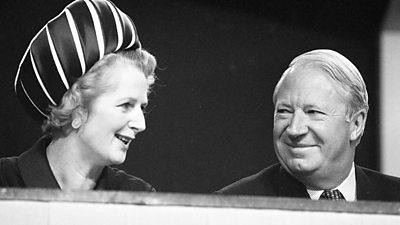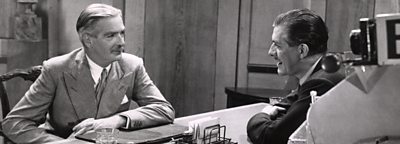Image: Prime Minister Anthony Eden interviewed by Leslie Mitchell, October 1951.
Party Political Broadcasts (PPBs) have been a feature of national life since the General Election of 1924. Initially considered a duty by the ����ý, as the monopoly public service broadcaster, arrangements remained informal until a Committee on Political Broadcasting was set up between the ����ý and the political parties in 1947. Four years later, in 1951, the first Party Election Broadcasts were televised.
The early adoption of television by politicians mean that, as with political output more broadly, Party Political/Election Broadcasts became a testing ground for a range of new visual styles of presentation. These early days, as Tony Benn recalls, produced some curious spectacles.
As professional programme-makers ����ý staff were used to making their own editorial choices. However, in the case of Party Political Broadcasts the ����ý acted, initially at least, as a technical expert providing resources – studio space, equipment, manpower, broadcast time – with which the political parties would bring their own visions to life.
As the ����ý’s John Grist (who oversaw many of these productions) explains, this could lead to some rather anxious moments, particularly in the case of live broadcasts, as transmission time approached.
More recently, Party Political Broadcasts have been devised and made independently of the ����ý or, indeed, any other broadcasters. Party machines have taken control of the whole process and as production styles and values have evolved, so the costs of making them have risen astronomically. But is it worth the effort and money? The Conservative’s William Whitelaw remained unconvinced.
Across the political divide, Harold Wilson believed that
the Party Political Broadcast has outlived its usefulness. What’s more, our people make the most dreadful use of it – it is a waste of time.
But is it a necessary waste? Would any of the Party’s really be willing to vacate the field and leave this ritual of election politics to its competitors? The evidence so far suggests not.
-
10.7 MB
Party Conferences
As the ����ý’s Washington Correspondent after World War II, Leonard Miall had observed and reported on the National Conventions of both Democrats and Republicans. On his return to the United Kingdom as the incoming head of Television Talks in 1954, he found it odd that the ����ý did not cover domestic Party Conferences in the same way.
As a result of his efforts, later that year the ����ý reported from the Conservative Party Conference in its television output for the first time. The following year, the Labour Party agreed to a trial on one morning.
Alerting delegates to the arrival of cameras the next day, the Chair of the Labour Party Edith Summerskill MP warned them to expect hotter than usual conditions because of the lighting. As Miall recalled, ‘they all turned up the next day with hats coming down over their eyes and dark specs’.

This was the start of regular television coverage at Party Conferences, which has been a fixed part in the political broadcasting calendar ever since. And for the ����ý’s Parliamentary Correspondent, E.R. Thompson, these events offered a curiously compelling glimpse of the exercise of power.
Search by Tag:
- Party Political Broadcasts
- Voices of the ����ý
- Elections
- Party Political and Election Broadcasts 1959
- Party Political and Election Broadcasts 1970
- Party Political and Election Broadcasts 1987
- Party Political and Election Broadcasts 1924
- Tony Benn
- John Grist
- William Whitelaw
- Political Party Conferences
- Leonard Miall
- Edith Summerskill MP
- ER Thompson

